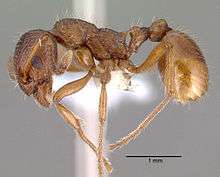Myrmica rubra
| Myrmica rubra | |
|---|---|
 | |
| worker | |
| Scientific classification | |
| Kingdom: | Animalia |
| Phylum: | Arthropoda |
| Class: | Insecta |
| Order: | Hymenoptera |
| Family: | Formicidae |
| Subfamily: | Myrmicinae |
| Tribe: | Myrmicini |
| Genus: | Myrmica |
| Species: | M. rubra |
| Binomial name | |
| Myrmica rubra (Linnaeus, 1758) | |
Myrmica rubra, also known as the European fire ant or common red ant, is a species of ant of the genus Myrmica, found all over Europe and in some parts of North America and Asia.[1] They are mainly red in colour, with slightly darker pigmentation on the head. The ants live under stones, fallen trees, and in soil. They are aggressive ants, often attacking rather than running away, and are equipped with a sting, though lack the ability to spray formic acid like the genus Formica.[2]
This is one of the most common and widespread Myrmica species of the Palaearctic. Occurs in the region stretching from Portugal to East Siberia (till Transbaikalia), and from northern Greece to the forest-tundra natural zone in the North.[3] It is also currently invading Japan and North America where they are considered a nuisance as it is an invasive species.
Their colonies have a polygyne form, and can have up to one hundred queens per nest.[4] They are also polydomous, with many nest sites per individual colony.[1] These queens will have gathered together after their nuptial flight and will have formed a nest and laid their eggs in it. The queens can live up to fifteen years. Nuptial flights take place normally in late July to mid-August in Europe. Hundreds of young queens and males take to the air to mate together. Afterwards, the males die and the queens shed their wings to make a new colony. No nuptial flights have been witnessed yet from this species where it is living in North America.[1]
They are very common in Europe and live in meadows and gardens. They live on a diet of honeydew excreted by aphids, and, being very aggressive like to eat many types of insect and other invertebrates. They will attack any creature that disturbs their nest, but are not as aggressive as the red imported fire ant. They also consume pollen, a phenomenon rarely documented in ants of the temperal zone.[5]
It is very similar to M. ruginodis, and the differences are very hard to tell. However, Myrmica rubra is the commoner of the two.
The larvae of the butterfly Maculinea alcon (Alcon Blue) as well as Maculinea teleius use Myrmica rubra as their primary host.[1]
References
- 1 2 3 4 "European fire ant". Featured Creatures. University of Florida/Institute of Food and Agricultural Sciences. Retrieved 2008-06-25.
- ↑ "Myrmica rubra (insect)". issg.org. Retrieved 2008-06-25.
- ↑ Czekes Z, et al. (2012). "The genus Myrmica Latreille, 1804 (Hymenoptera: Formicidae) in Romania: distribution of species and key for their identification" (PDF). Entomologica romanica. 17: 29–50.
- ↑ "Species of ant". antnest.co.uk. Retrieved 2008-06-25.
- ↑ Czechowski W, et al. (2011). "Rubbish dumps reveal the diet of ant colonies: Myrmica schencki Em. and Myrmica rubra (L.) (Hymenoptera: Formicidae) as facultative pollen-eaters" (PDF). Polish Journal of Ecology. 56: 737–741.
External links
| Wikimedia Commons has media related to Myrmica rubra. |
- Ant wiki information on Myrmica rubra.
- Brief report from the University of Maine on the management of Myrmica rubra in the U.S., with extensive additional references